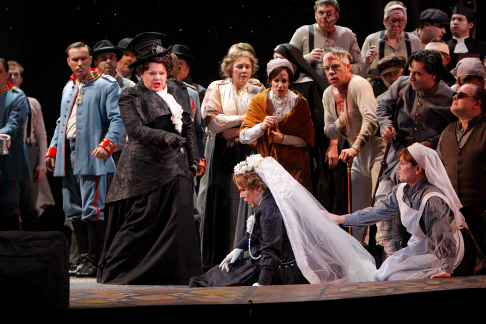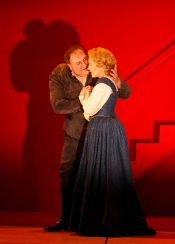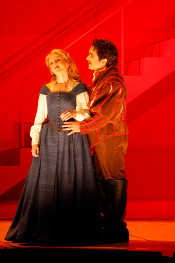![Ben Heppner as Lohengrin [Photo by Robert Millard courtesy of Los Angeles Opera]](http://www.operatoday.com/13-lgrn5049.png)
31 Dec 2010
December at Los Angeles Opera: Lohengrin and Rigoletto
At the end of November Los Angeles Opera brought two productions to the stage of the Dorothy Chandler Pavilion.
English Touring Opera are delighted to announce a season of lyric monodramas to tour nationally from October to December. The season features music for solo singer and piano by Argento, Britten, Tippett and Shostakovich with a bold and inventive approach to making opera during social distancing.
This tenth of ten Live from London concerts was in fact a recorded live performance from California. It was no less enjoyable for that, and it was also uplifting to learn that this wasn’t in fact the ‘last’ LfL event that we will be able to enjoy, courtesy of VOCES8 and their fellow vocal ensembles (more below …).
Ever since Wigmore Hall announced their superb series of autumn concerts, all streamed live and available free of charge, I’d been looking forward to this song recital by Ian Bostridge and Imogen Cooper.
The Sixteen continues its exploration of Henry Purcell’s Welcome Songs for Charles II. As with Robert King’s pioneering Purcell series begun over thirty years ago for Hyperion, Harry Christophers is recording two Welcome Songs per disc.
Although Stile Antico’s programme article for their Live from London recital introduced their selection from the many treasures of the English Renaissance in the context of the theological debates and upheavals of the Tudor and Elizabethan years, their performance was more evocative of private chamber music than of public liturgy.
In February this year, Albanian soprano Ermonela Jaho made a highly lauded debut recital at Wigmore Hall - a concert which both celebrated Opera Rara’s 50th anniversary and honoured the career of the Italian soprano Rosina Storchio (1872-1945), the star of verismo who created the title roles in Leoncavallo’s La bohème and Zazà, Mascagni’s Lodoletta and Puccini’s Madama Butterfly.
Evidently, face masks don’t stifle appreciative “Bravo!”s. And, reducing audience numbers doesn’t lower the volume of such acclamations. For, the audience at Wigmore Hall gave soprano Elizabeth Llewellyn and pianist Simon Lepper a greatly deserved warm reception and hearty response following this lunchtime recital of late-Romantic song.
Collapsology. Or, perhaps we should use the French word ‘Collapsologie’ because this is a transdisciplinary idea pretty much advocated by a series of French theorists - and apparently, mostly French theorists. It in essence focuses on the imminent collapse of modern society and all its layers - a series of escalating crises on a global scale: environmental, economic, geopolitical, governmental; the list is extensive.
For this week’s Live from London vocal recital we moved from the home of VOCES8, St Anne and St Agnes in the City of London, to Kings Place, where The Sixteen - who have been associate artists at the venue for some time - presented a programme of music and words bound together by the theme of ‘reflection’.
'Such is your divine Disposation that both you excellently understand, and royally entertaine the Exercise of Musicke.’
Amongst an avalanche of new Mahler recordings appearing at the moment (Das Lied von der Erde seems to be the most favoured, with three) this 1991 Mahler Second from the 2nd Kassel MahlerFest is one of the more interesting releases.
‘And there was war in heaven: Michael and his angels fought against the dragon; and the dragon fought and his angels, And prevailed not; neither was their place found any more in heaven … that old serpent … Satan, which deceiveth the whole world: he was cast out into the earth, and his angels were cast out with him.’
If there is one myth, it seems believed by some people today, that probably needs shattering it is that post-war recordings or performances of Wagner operas were always of exceptional quality. This 1949 Hamburg Tristan und Isolde is one of those recordings - though quite who is to blame for its many problems takes quite some unearthing.
There was never any doubt that the fifth of the twelve Met Stars Live in Concert broadcasts was going to be a palpably intense and vivid event, as well as a musically stunning and theatrically enervating experience.
‘Love’ was the theme for this Live from London performance by Apollo5. Given the complexity and diversity of that human emotion, and Apollo5’s reputation for versatility and diverse repertoire, ranging from Renaissance choral music to jazz, from contemporary classical works to popular song, it was no surprise that their programme spanned 500 years and several musical styles.
The Academy of St Martin in the Fields have titled their autumn series of eight concerts - which are taking place at 5pm and 7.30pm on two Saturdays each month at their home venue in Trafalgar Square, and being filmed for streaming the following Thursday - ‘re:connect’.
The London Symphony Orchestra opened their Autumn 2020 season with a homage to Oliver Knussen, who died at the age of 66 in July 2018. The programme traced a national musical lineage through the twentieth century, from Britten to Knussen, on to Mark-Anthony Turnage, and entwining the LSO and Rattle too.
With the Live from London digital vocal festival entering the second half of the series, the festival’s host, VOCES8, returned to their home at St Annes and St Agnes in the City of London to present a sequence of ‘Choral Dances’ - vocal music inspired by dance, embracing diverse genres from the Renaissance madrigal to swing jazz.
Just a few unison string wriggles from the opening of Mozart’s overture to Le nozze di Figaro are enough to make any opera-lover perch on the edge of their seat, in excited anticipation of the drama in music to come, so there could be no other curtain-raiser for this Gala Concert at the Royal Opera House, the latest instalment from ‘their House’ to ‘our houses’.
"Before the ending of the day, creator of all things, we pray that, with your accustomed mercy, you may watch over us."
![Ben Heppner as Lohengrin [Photo by Robert Millard courtesy of Los Angeles Opera]](http://www.operatoday.com/13-lgrn5049.png)
At the end of November Los Angeles Opera brought two productions to the stage of the Dorothy Chandler Pavilion.
At the end of November Los Angeles Opera brought two productions to the stage of the Dorothy Chandler Pavilion. Debuting first was a new production of Richard Wagner’s Lohengrin, which received one of the most harshly sarcastic reviews from the Los Angeles Times within memory, the writer taking the easy opportunity to equate the premiere over Thanksgiving weekend with the term “turkey.” The Rigoletto that premiered a few nights later earned itself much more a favorable response in the same paper. Seen later in their runs by this reviewer, the impressions were not necessarily reversed, but certainly it can be said that the Lohengrin had settled down into a mostly satisfying show with a few amazing strong points, while the Rigoletto, while enjoyable, provided a decent but not all that memorable night at the opera.
Placido Domingo’s initial year as General Director of Los Angeles Opera began shortly after the terrible events of September 11, 2001, with a new production of Lohengrin. That production was scrapped this season for a new one directed by Lydia Steier, with scenery and costumes by Dirk Hofacker. In Steier’s vision, the action took place in an era reminiscent of World War I, in the ruined shell of a building vaguely governmental or cathedral-like. On a turntable, the set revolved sometimes to place action just outside the over-sized doors to the ruin. Steir has a background in choreography, which was evident in the stylized movement of the Brabant populace — the men either shell-shocked or brutes in uniform, and the women nurses or easy prey for the sexual aggression of the soldiers. In the opening scene, shadow-lit behind a tent, a doctor amputates a leg and seemingly loses the patient — while a nurse brings out the severed appendage for disposal, another nurse inside the tent places a blanket over the body. After Friedrich of Telramund makes his accusation of fratricide against Elsa, it is from this tent that Lohengrin emerges — in soldier’s uniform, with silver-plating from the knee down on one leg.
Clearly Steir is playing with the libretto’s mixture of the miraculous within the context of a militaristic society. Those who complained that a swan never appeared, therefore, had to have ignored the flags of victory festooning the stage in act three — Lohengrin’s prosthetic leg of metal emblazoned on some and a swan on the others. Ultimately, a viewer of any production can decide how deeply he or she wants to consider a director’s vision — in this case, anyone ill-disposed to directorial insight would be expected to dismiss the staging as nonsense, while those more open to alternative visions can decide for themselves whether Steier’s ideas came together or never quite melded into a coherent presentation (and probably an under-rehearsed opening night led to the unfortunate notices referenced above). At any rate, the production had some lovely moments, as snow fell over the ruin and the backscreen projections provided sweeping views of a devastated landscape beneath glowering but gorgeous skyscapes. In a nicely managed theatrical coup, Lohengrin disappears at the end back into the tent from which he emerged, and a moment later, the tent comes down to reveal Elsa’s brother standing on the hospital bed.
 Dolora Zajick as Ortrud and Soile Isokoski as Elsa
Dolora Zajick as Ortrud and Soile Isokoski as Elsa
Ben Heppner’s career has been dogged in recent years by vocal struggles, and he started the evening with an unsupported, wobbly voice that disheartened anyone hoping for a “comeback” evening. He slowly recovered a fair amount of control, and though the voice never reached the beauty of his best years, he was doing quite well until a couple of small breaks in his closing moments diminished his success. The costumes did not flatter him, but otherwise he gave himself over to the concept and portrayed an otherworldly creature who quickly finds himself disenchanted with the more “normal” folk of Brabant.
Soile Isokoski’s overdue debut with the Los Angeles Opera found the soprano in wonderful voice, her gentle Elsa also far from home among the Brabant crowd, and yet not confident enough to give herself over to the man who has come to rescue her. Isokoski’s instrument is not the largest, but in all the big moments the voice was there — controlled yet autonomous, with an aching beauty in the middle. In the classic act two confrontations with Ortrud, Isokoski held her own against the powerhouse performance of the evening, from Dolora Zajick, in an amazing role debut. Zajick’s aggressive top fits the role of Ortrud well, and she threw herself into the strong-willed character's scheming aggression. Zajick’s tour de force did take away somewhat from James Johnston’s Friedrich, a bit more pallid vocally that one would like, but strongly inhabiting the part of a man grasping frantically at the shreds of his dignity.
 George Gagnidze as Rigoletto and Sarah Coburn as Gilda
George Gagnidze as Rigoletto and Sarah Coburn as Gilda
James Conlon and the LAO orchestra took a while to settle themselves, the prelude not having the ideal ethereal quality. But when the score let loose, the orchestra was there, and the horns in particular had a successful night. Rigoletto showed Conlon in total command a few nights later, with all the energy matched by a feel for the rare tender moments in Verdi's masterpiece.
The Mark Lamos production, borrowed from San Francisco, takes the stylistic conceit of appropriating the painter Giorgio de Chirico’s city blocks of ominously muted pastels. The spare sets serve the story well enough, though it seemed odd that minutes-long pauses were required (one in the act on scene change and one after intermission, between the last two acts) when not all that much changed on stage. So in place of interpretation the opera-goer gets a nice looking production, with the important consideration that the sets allow the singers to step forward and project to the audience a great deal of the time.
In the title role George Gagnizde offered a sizable voice and a physique to match one’s expectations. If he lacked that last trace of unique personality that makes for a great portrayal, he still had much to offer. The Chandler audience was as besotted as Rigoletto with his daughter, sung with beauty and taste by Sarah Coburn. In a house not always known to be friendly to lighter voices, Coburn demonstrated that her lyric instrument has an unexpected carrying power. Her Gilda fell for a reasonably good-looking Duke, sung by Gianluca Terranova, who did best with the more energetic numbers that open and close his role. His big act two aria needed more elegance. While not a huge voice, it is ample enough, and he may develop into a more interesting tenor. Andrea Silvestrelli is one of the great Sparafucile’s, his lean physique as perfect for the character as is his menacing, cavernous bass. Kendall Gladen as his sister made the most of her brief time on stage. She has the type of charisma that can make a mezzo a star Carmen or Dalila.
 Sarah Coburn as Gilda and Gianluca Terranova as Duke of Mantua
Sarah Coburn as Gilda and Gianluca Terranova as Duke of Mantua
It was a very full and happy house for the Rigoletto, and the mid-week Lohengrin had a substantial attendance as well, and one that mostly stayed until the 11pm conclusion. This year’s shorter season will wrap up by April, after two more productions. In a few weeks, the announcement of the 2011-2012 season for the Los Angeles Opera will reveal just how well the company has come through some times bordering on, if not encroaching into, the desperate. But at least on the stage, as of this December — this is a strong and forward-looking company.
Chris Mullins